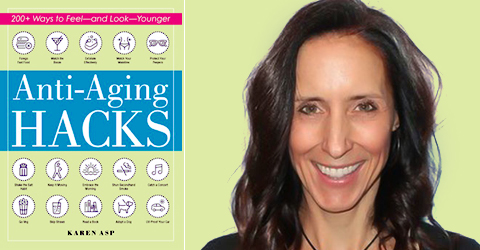

Excerpted from Anti-Aging Hacks by Karen Asp. Copyright © 2019 Simon & Schuster, Inc. Used by permission of the publisher, Adams Media, a division of Simon and Schuster. All rights reserved.
Hack 025
Switch to Non-Dairy Milk
Got acne issues? How about wrinkles? Bet you didn’t realize that dairy could be the culprit! Dairy has such a strong link to acne that a study from the Journal of the Academy of Nutrition and Dietetics called it a leading cause (along with high-glycemic foods). Why? Cow’s milk contains insulin-like growth factor-1 (IGF-1), which could be one driver of acne. Plus, lactose intolerance, which becomes more common as you age, can worsen acne. Dairy has also been linked to increased skin wrinkling.
Women who drank the most milk suffered the most hip fractures
What about your health? Consuming dairy products has been linked with greater risk of several cancers, namely prostate, breast, and ovarian cancers, as well as obesity, diabetes, and heart disease. Plus, you’re ingesting a load of contaminants—anything from hormones to pesticides— that can affect human health. And that assumption that you need dairy to protect against hip fractures? A British Medical Journal study followed over 100,000 Swedish men and women for twenty years, and although high milk intake was associated with greater deaths in men and women, women who drank the most milk suffered the most hip fractures (the finding didn’t apply to men).
Fortunately, non-dairy alternatives are easier to find than ever, and they contain many of the same nutrients as dairy products. For non-dairy milk, try soy milk, which is most similar in terms of nutrients and texture to cow’s milk. If that doesn’t please your palate, there’s almond, coconut, flaxseed, hemp, and pea, to name just a few.
Hack 026
Boost Your Intake of Leafy Greens
Could a salad a day keep aging away? It’s possible. That’s one reason Dr. Michael Greger lists greens as part of his Daily Dozen: foods you should eat every day to live not only a high-quality life but a long one too. The reason? “Dark-green, leafy vegetables are the healthiest foods on the planet,” he writes.
Here’s why he says that. When Harvard University researchers analyzed numerous food groups, greens were associated with the strongest protection against major chronic diseases, including heart attacks and strokes. For every daily serving of greens you eat, your risk of these two diseases drops by about 20 percent.
Then there are the brain benefits you’ll enjoy if you eat lots of greens. Healthy seniors who ate a daily serving of leafy greens (1/2 cup of cooked or 1 cup of raw greens) had a slower rate of cognitive decline, versus folks who ate little or no greens, according to a study in the journal Neurology. Those who ate their daily greens had brains that were about eleven years younger than folks who ate less.
Aim for at least two servings a day of greens, which could include arugula, beet greens, collard greens, mustard greens, and turnip greens, as well as kale, mesclun, spinach, and Swiss chard. One serving is 1 cup of raw greens, or 1/2 cup of cooked. One note, though: if you’re taking Warfarin (known as Coumadin), talk with your physician before you start eating more greens, as the vitamin K in the greens can interfere with Warfarin’s efficacy.
Hack 035
Lower Your “Fitness Age”
You can’t lower your real age, but lowering your fitness age could be one of your best anti-aging strategies. What is fitness age? It’s a way to assess how old your body thinks it is, regardless of your real age. While you used to have to go to a lab to determine this, Swedish researchers developed a calculator so anybody can determine their fitness age. You just have to plug in certain numbers like your waistline measurement, maximum heart rate, exercise frequency and intensity, and your weight. Visit www.worldfitnesslevel.org to find a free quiz you can take in less than ten minutes. Check in every six months or so to see if your number has changed. That’s right—your fitness age isn’t set in stone. You can always lower it, and you should, especially if it’s either the same as or greater than your real age. If your fitness age is higher than your real age, take that as a sign to act. How can you lower your fitness age? Here are three easy ways: shoot for 10,000 steps a day, vary the intensity of your workouts, and build some muscle strength.
Here’s why it’s key to lower your fitness age: you’ll gain additional years in life—about one to two years, according to some studies—and lower your risk of cancer and heart disease. You’ll also improve your quality of life, and you’ll be able to do more without getting so fatigued.
Hack 040
Eat More Vegetarian Meals
When it comes to living longer, vegetarians are leading the pack. Numerous reasons might prompt you to push meat aside and eat more plants — but one of the most compelling might come from a study conducted by Harvard T.H. Chan School of Public Health researchers, who found that roughly one-third of early deaths could be prevented if everybody moved to a plant-based diet. In other words, go veg!
A plant-based diet is the only diet that’s been proven not only to reverse but also prevent heart disease.
The benefits of eating plants over animals extend beyond just living longer. By eating more plants, you’ll lower your risk for numerous chronic diseases, including heart disease, cancer, type 2 diabetes, obesity, and rheumatoid arthritis. In some cases, you might even be able to reverse the progress of some of these diseases. A plant-based diet is the only diet that’s been proven not only to reverse but also prevent heart disease.
Plus, by eating more plants, your skin quality will improve. People who switch to a plant-based diet sometimes notice that skin issues like acne and redness immediately clear up. Over time, their complexion improves and their skin tone looks healthier.
And of course, the environment and animals will also benefit.
Need help figuring out how to eat veg? Sign up for the Physicians Committee for Responsible Medicine’s 21-Day Vegan Kickstart Program, which starts every Monday. Or visit sites like www.forksoverknives.com, www.onegreenplanet.org, and nutritionstudies.org, all of which are loaded with tips and recipes. And if you want to learn more about plant-based eating, watch one of the many documentaries available on the topic, including Forks Over Knives, What the Health, PlantPure Nation, Cowspiracy, Speciesism, e Game Changers, and Dominion.
Hack 070
Don’t Sit for More Than Thirty Minutes at a Time
Bet you’ve heard that sitting is the new smoking. And it’s true—to some extent. Sitting too long really can kill you, even if you’re a devout gym-goer. When you sit for prolonged periods—research indicates that people spend 50 to 60 percent of their waking hours, or about eight to ten hours a day, sitting down—your body begins to shut down metabolically. The rate at which your fat cells produce fat accelerates. Blood flows more slowly throughout your body when you sit, which makes it more likely that fatty acids will add to plaque build-up in your heart’s vessels. Sitting even compromises blood flow in your lower extremities, which can create dangerous conditions like deep vein thrombosis. And because you’re not burning as many calories as when you’re moving or standing, you risk gaining weight.
Bottom line? Sitting for prolonged periods of time is a risk factor for early death, and that risk increases the more you sit. According to a study in Annals of Internal Medicine, for folks sitting more than thirteen hours a day, their risk of death was 200 percent greater than those sitting for less than eleven hours a day. Even folks who exercised regularly weren’t off the hook.
Research suggests that limiting sit time to fewer than thirty minutes is the best practice. Set a timer every thirty minutes if you must, whether you’re in the office or at home, and take a five-minute standing break. Bonus points if you incorporate movement (think simple stretches, walking, or climbing stairs) into that break.
Hack 077
Re-establish Good Sleep Habits
Without proper sleep, your skin ages, your health crumbles, and you may not live as long—which is why you need to work on getting seven to nine hours every night. Here’s sleep’s surprising link to skin: sleeping for six hours just five nights in a row doubles the number of fine lines and wrinkles and increases brown spots and dark circles under the eyes. If too little sleep were to become your standard, all of those effects could worsen, triggering premature skin aging and permanent skin discoloration.
Studies have also shown that inadequate sleep contributes to heart disease, cancer, diabetes, and obesity; impairs learning and memory and raises your risk of Alzheimer’s; weakens your immune system so you’re more vulnerable to colds and the flu; affects your physical and mental performance; contributes to depression and other mental health disorders; and can even cause an early death. e list goes on, but suffice it to say that if you’re among the one in every three Americans not getting the sleep you need, your health will suffer. Sleep, after all, is the only time your body has to heal—just ask any athlete about the powers of sleep— and without that time, negative consequences will result.
The National Sleep Foundation recommends that individuals older than eighteen log seven to nine hours of sleep a night. To help you achieve that, stick with a consistent bedtime and wake-up time, even on weekends; establish a relaxing bedtime ritual like taking a bath or meditating; avoid napping in the afternoons if you’re having trouble sleeping; exercise daily; and sleep in a cool, dark, noise-free room.
Hack 104
Meditate for One Minute a Day
If you want to dump stress (which is no doubt showing up on your skin), and even gain protection from aging on the cellular level, give meditation a shot for a single minute a day.
Studies show that regular meditation helps improve brain health, but it’s also protecting you against aging on the cellular level. People with a longtime meditation practice—ten years in one study—have longer telomeres (the caps on your DNA strands) than people who have never meditated, and longer telomeres are associated with longer life.
You don’t need to spend hours meditating every day to get the benefits. Even just one minute a day can give you the benefits of meditation. Once you find that you can set aside a minute a day—consider doing it before you get out of bed or right before you fall asleep—add a few more minutes until you’re consistently doing between five and ten minutes a day. Just don’t beat yourself up when your mind wanders, because it will. The main goal of meditation isn’t to have your mind be entirely still. It’s to train you to pull your mind back to the present every time it wanders away. As you get better at meditating, focusing becomes easier.
Whether you do guided or unguided is also a personal preference. It might be best to start with guided meditation, especially if you’ve never done it, and then move into unguided once you get comfortable with it. Try using apps like Calm and Headspace for assistance.
Copyright 2025 Center for Nutrition Studies. All rights reserved.
Deepen Your Knowledge With Our
Plant-Based Nutrition
Certificate
Plant-Based Nutrition Certificate
- 23,000+ students
- 100% online, learn at your own pace
- No prerequisites
- Continuing education credits







